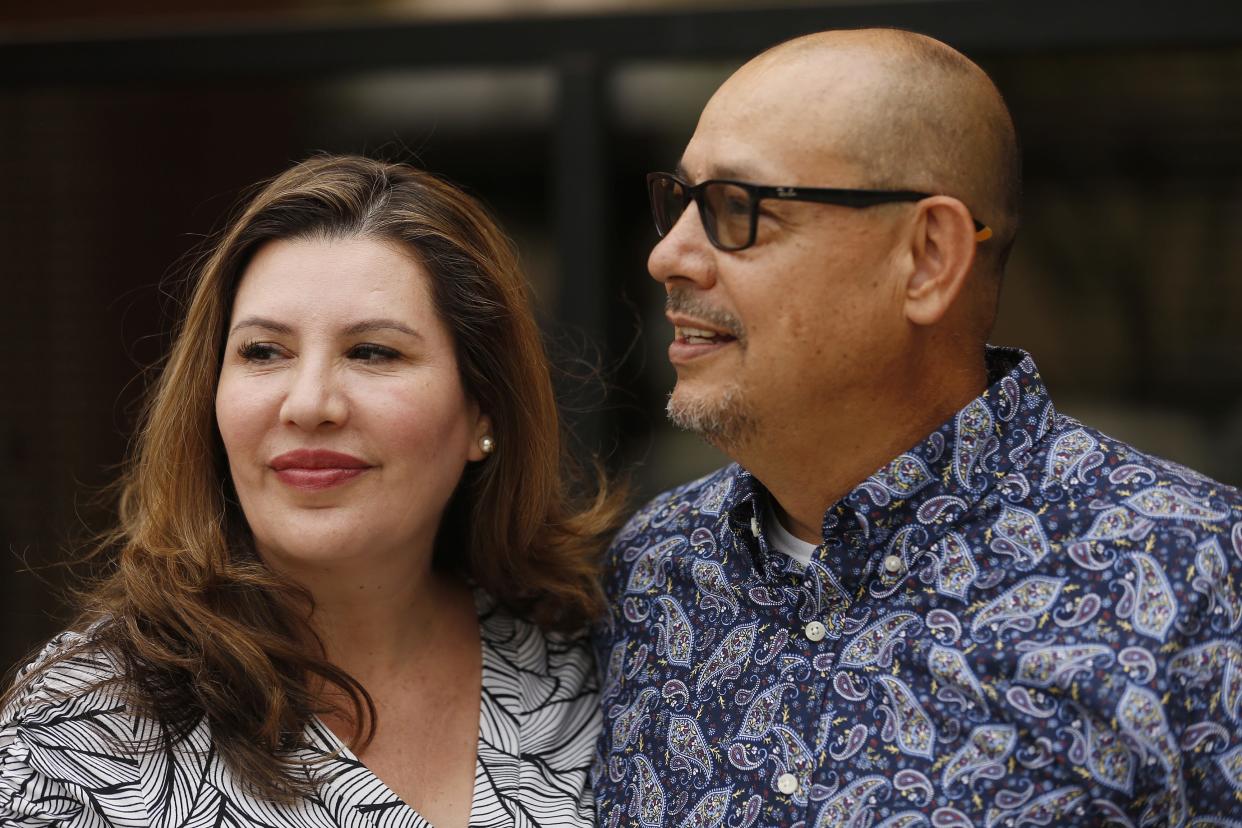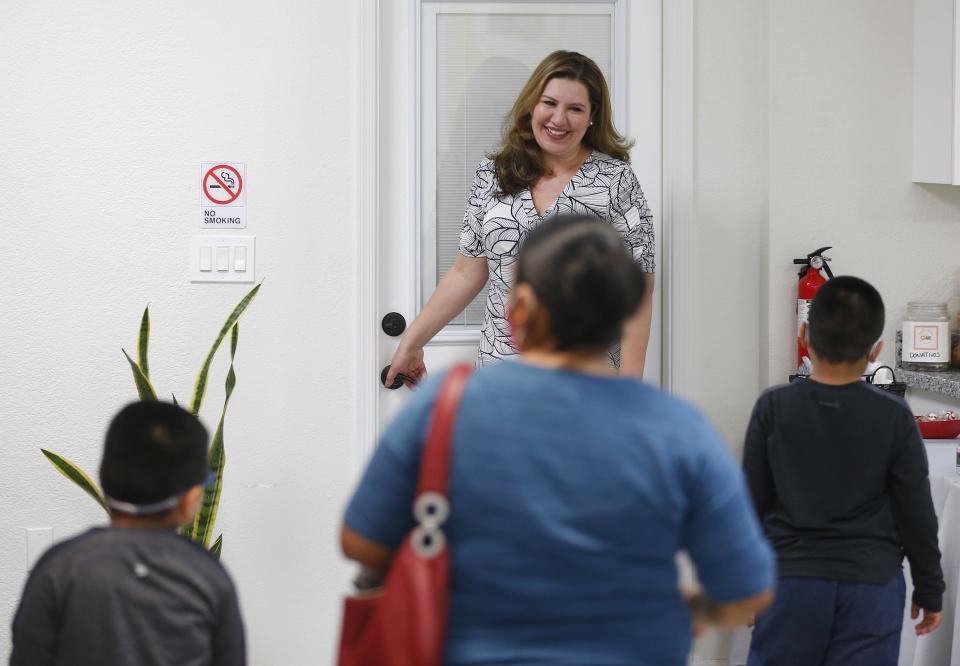Phoenix couple helps thousands of Spanish-speaking families of people with disabilities

Anabel Quintana sat and listened as an education advocate spoke in Spanish to a room of 20 parents about a voucher program for students with disabilities at a meeting in April.
For 10 years, Quintana said she has attended monthly meetings like this through a support group to learn about resources in Spanish for her son, who was diagnosed with autism when he was about 3 years old.
The group, called Grupo de Apoyo Para Niños, or GANE, a parent-led support group in Spanish for families with kids and adults with disabilities, is where Quintana said she first learned about autism.
The meetings are also where she met a couple, Gabby and José Orozco, who has led the group for 15 years to provide support, information and resources for free for an estimated 2,000 to 3,000 Spanish-speaking and immigrant families like Quintana and her son in Phoenix.
"They help a lot of families," Quintana said. "They do a lot of things for us."
For more stories that matter, subscribe to azcentral.com.
The Orozcos started leading the group after they moved to Arizona from California in 2004. They knew the difficulties of navigating the special education system for their son Joshua, who is now 27 and has autism, so they wanted to help other parents do the same.
"We saw the need to help in the Hispanic community and that’s really our passion," said Gabby. "We came here just to visit the group and see how it is and they ended up saying, 'Can you please stay here? Help us out and organize it?' ... And we’ve been here ever since."
Couple teaches parents to stand up for themselves, their child's rights
Through GANE, Gabby and José, who is a certified translator, assist parents by translating information into Spanish and teaching them about what resources are available in their community and schools.
"There’s more resources, information for English-speaking families," Gabby said. "Even English-speaking families can have a hard time with certain supports and services, but for Spanish-speaking families, the barrier is even more challenging."

A lot of information that could benefit the families in GANE was only available in English, so the couple said they took it upon themselves to translate the materials. Every month, the group hosts an expert or advocate to educate families, in Spanish, about resources available to them.
The couple also believes it's important to educate parents on what their rights are and how to stand up for themselves in Individualized Education Program meetings for students with disabilities, said the Orozcos, who have attended many IEP meetings with families to discuss their child's goals with the school.
"When somebody tells them, 'Well, you're not going to get any support' ... anything that they'll tell them, they will take it," Gabby said. "They have to see that 'This is something my son and daughter needs, I deserve.' And they should be more outspoken about it, but it's something we continue helping them with."
At the group's April meeting, José handed Quintana a packet — she said he reviewed her son's IEP because she was unsure of what to do after his necklace was stolen at school. The school didn't take action for her son, who is also hyperactive and non-verbal, so she said she planned to meet with the district after consulting with José.
In addition to providing information on schools, IEPs and resources for children and adults with developmental disabilities, the couple said they also help families with their day-to-day needs.
When the pandemic started, Gabby said many families struggled to transition to online school since they didn't have internet access or know how to use some of the required technology, so they helped families learn how to sign in to class online.
"That’s our niche. Working with kids, working with people, and now having our son with a disability, we know what it’s been like, and we just try to lend a helping hand as much as we can," José said.
Arizona should translate, provide all materials in Spanish, couple says
The Orozcos said everything should be translated to Spanish at the state level since over a quarter of Arizona households speak a language other than English at home, according to U.S. census data, which found in 2015 that over 1.2 million Arizonans speak Spanish at home, and about 458,000 reported they spoke English less than "very well."
"We try to do what we can," Gabby said. "But it should be translated at a state level, every single thing should be translated so families can at least have that support and resources."
Since the 2010-11 school year, the number of students in Maricopa County who are Hispanic or Latino has increased by about 18%. They also make up the largest group of students in Maricopa County, according to the Arizona Department of Education's enrollment data.
After years of holding meetings at various locations, the Orozcos found a permanent home for the group's events at their business, Ideal Care, which provides at-home services for people with disabilities.
Over time, numbers of families participating in the group have also fluctuated due to deportations, Gabby said, but many Spanish-speaking and immigrant families have been part of the group for as long as they've led it.
Since she's met the Orozcos, Quintana said they have not only provided support and resources for her son but also have been like family. Whenever she needs their assistance with her son's school or other concerns, they are there to help her, she said.
"They'll always be there," Quintana said. "It doesn't matter if it's Saturday or Sunday. ... They call back immediately."
Reach the reporter at Audrey.Jensen@arizonarepublic.com or on Twitter at @Audreyj101.
This story is part of the Faces of Arizona series. For years, people in Arizona’s diverse communities have said they don’t see themselves reflected in the newspaper, and that they want to see more good news about their people. These profiles are a step in that direction. Have feedback or ideas on who we should cover? Send them to editor Kaila White at kaila.white@arizonarepublic.com.
Support local journalism. Subscribe to azcentral.com today.
This article originally appeared on Arizona Republic: Phoenix couple leads support group in Spanish for families of disabled

